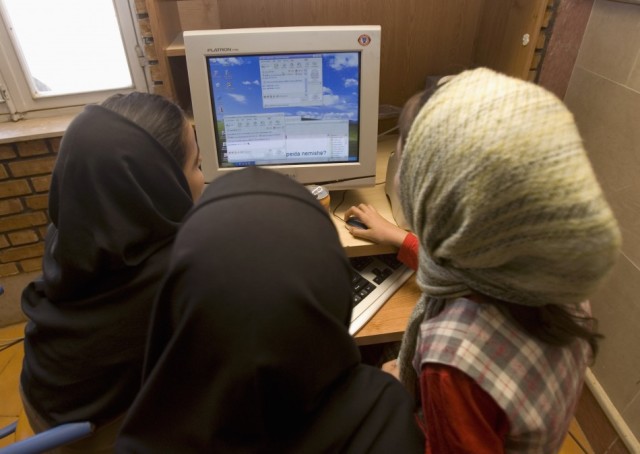by Ali Reza Eshraghi
“Restrictions on social media must be lifted,” said Ali Jannati, Iran’s Minister of Culture and Islamic Guidance to Aljazeera this Monday, admitting that he has been using Facebook for the past three years. His words are compelling, but recent events have not been very promising.
In the final days of 2013, Iran filtered a social media App for Smartphones, called WeChat. Even though this communication service is among the top five most popular in the world, the West did not pay enough media attention to its crackdown in Iran. Perhaps that’s because unlike Facebook, Twitter and Instagram this platform is made in China! But in Iran, which according to the estimation of the Minister of Communications and Information Technology (CIT), WeChat has almost four million users, the restriction aroused some hot debates.
Since Hassan Rouhani’s administration took power, this has been the most noticeable instance of filtering in Iran. Skeptics consider this move a clear indication that the new administration, contrary to its promises, will continue past policies in restricting cyber space. The old and frequently used, simplified narrative about Iran and its Internet made a comeback in depicting the state as the ultimate villain occupied with preventing the free flow of information and communication to its citizens.
Such a narrative overlooks a (sometimes) comical paradox: if filtering is about blocking criticism, why is openly criticizing the act of filtering allowed? Indeed, many online and print media have condemned the filtering of WeChat. People have left hundreds of comments on websites — even on the infamous Fars News Agency — lambasting the Islamic Republic regime for restricting their freedom. One person, whose comment on a progressive website affiliated to the Principlists front received over 350 likes, wrote: “[how] with such stone age measures the [regime] expect not to be condemned [at the UN] for violating human rights.” None of these comments are censored.
What really happens in Iran’s virtual sphere is more complicated than we think. When it comes to the state’s policies vis–à–vis the Internet and especially social media, there are many areas of confusion and contradiction, inconsistency and incongruity among and between various stakeholders. It is one of those muddy, murky and messy situations.
Now let us review some weird facts about this wired world.
Who lets the dogs out?
In Iran, different entities can independently implement filtering. For example, two weeks ago the Tehran Prosecutor suddenly decided to filter the website of Ali Motahari, the MP famous for criticizing the Judiciary’s oppressive policies. Also, the Ministry of CIT, which is monitored by the executive branch of government, has the power to prevent access to certain applications or content at whim (as it did during former President Mahmoud Ahmadinejad’s term.)
The major authority responsible for filtering the news has a long and strange Orwellian name: the Committee for Identifying Instances of Criminal Content. To the Iranian public, CIICC is nicknamed “The Filtering Committee.” The committee was not initially fond of this label, but now it proudly uses it. However, the story does not end here. Some ISPs (Internet service provider) in Iran are privately owned while others are state-owned and this means each has its own policies. In order to survive as a business, some private ISPs impose even stricter policies than the government-owned ones. Therefore, the experience of Internet users depends on which service they subscribe to and varies in different parts of the country.
Looking back to the issue of WeChat, it was the Filtering Committee that decided to block the App. The committee has twelve members, half of which are appointed by six of the administration’s ministries. Naturally, the bloc affiliated to the administration was expected to oppose the decision, but as the reports indicate, only the CIT representative was against it.
So far, Rouhani’s administration has given no explanation about the performance of its representatives on this council. This is contrary to the Rouhani’s campaign promise of supporting Internet freedom. Three days ago, the Telecommunications Minister tacitly implied that the administration’s appointed members “were not on the same page” and “henceforth they would coordinate better.” Does this mean that no more such surprises should be expected from Rouhani’s administration in the future? It is too soon to tell.
iFilter, Udownload!
The official reason provided for the filtering of WeChat was users’ “violation of privacy.” This kind of reasoning in the post-June 2013 election is interesting. Even the conservatives have realized that they must use proper wording to justify their actions in public. After all, who wants their privacy to be violated? But a closer look reveals that the main reason for filtering WeChat was Islamic morals. WeChat offers users the chance to find people nearby and “hook up” with members of the opposite sex without fear of the notorious Iranian morality police.
Of course, filtering is not the solution to everything. Similar applications to WeChat are available and users can download them in just a few minutes. Ramezanali Sobhanifard, a conservative MP and member of the Filtering Committee who supported blocking WeChat personally reported that people are now using another application called Coco. He said, “I have downloaded Coco” and advised people to use that “until WeChat is unblocked.” The funny thing is that Coco offers the same options that resulted in the filtering of WeChat. Users can search and meet new people nearby, enter public chat-rooms and “wink” at others. Unlike WeChat, Coco is an American application that was designed by a group of Harvard students.
The regime has filtered itself
Believe it or not, Esmail Ahmadi Moghadam, Iran’s chief of police — an outfit at the forefront of restricting social freedom — has criticized the filtering of WeChat. He even proposed reviewing the policies of the Filtering Committee in support of Rouhani’s views on freeing up the Internet. In one of his most direct criticisms of filtering policies during his campaign Rouhani said, “I wish the supporters of filtering would explain in restricting the people’s access to which news have they been successful?” It’s notable that Rouhani has not questioned the moral ground of the supporters of filtering and instead pointed out its ineffectiveness.
In Fall 2012, a study conducted by the Dubai-based online start-up incubator, Conovi, in partnership with Pars Online, the largest private ISP in Iran, found that 58 percent of Internet users in Iran regularly use Facebook. As Hessamolddin Ashena, the presidential cultural advisor and caretaker of the Presidential Center for Strategic Research recently said, the regime’s filtering policy is actually working against itself. Facebook can monitor Iranian users and so can the US’ National Security Agency (NSA) but “the filtering system effectively prevents the Iranian government from seeing and monitoring users.”
Filtering has only benefitted the sales of black market virtual private networks (VPN) and enhanced the designs of anti-filter software abroad; it is only the Iranian government that is losing popularity due to its policies. It is therefore no surprise that a consensus is forming in the higher echelons (including the police chief) to change Internet policies.
The Iranian regime has so far used traditional methods of policing the internet: territorializing cyber space, setting disciplines, and enforcing punishments. But now it is thinking about applying modern methods that echo the Foucauldian concept of governmentality: couching, supervising and managing the netizens of the virtual sphere. That’s why a high-ranking CIT official revealed efforts to negotiate with Internet giants like Google to allow their presence in Iran if they accept the regime’s policies.
Until now, there had only been talk of which sites to block, censoring, and filtering in the official discourse about the Internet — anything beyond that was forbidden. But these days there is talk of “modifying” and “optimizing” — in other words, removing the bad parts and using the rest instead of throwing the whole away.
Rouhani supports national Internet and…
Iran’s policy about launching a national Internet has not drastically changed with its new presidential administration. On Monday, Rouhani, in the first session of the Supreme Council of Cyberspace — the highest internet policymaking organization in Iran — stressed that national Internet must be launched by the end of 2015. The only difference in his remarks was that this national network “will not restrict access to international internet.”
Iranian opposition and the Western media have generally framed the regime’s intent in launching a national Internet as another attempt to restrict access to information and repress freedom of speech. But the truth is that the national Internet program was proposed and kick-started during the presidency of the reformist Mohammad Khatami. Since then different Iranian officials have stated that online communications within foreign platforms (such as Google) are a threat to the country’s security.
A year ago only Iran and China wanted to have their own national Internet and domesticated websites. But now, in the aftermath of revelations by whistleblower Edward Snowden, countries such as Brazil and India have considered launching internal networks of communication that will particularly avoid clutches with the NSA.
Consequently, Iran will continue cloning and domesticating virtual platforms. Already available domestic platforms have been relatively successful in attracting users despite having weaker platforms and designs compared to their international counterparts. For example, about 2.5 million Iranians use Cloob, the Iranian version of Facebook. There is even a newer version called Facenama, which currently ranks seventh among the most popular non-filtered Iranian websites according to Alexa web traffic data. Aparat, the Iranian YouTube, ranks fifteenth. Left with no other options, these cloned websites could potentially become more popular among Iranians than WeChat did among the Chinese.






As a part of its desire to reintegrate Iran into the global community, President Rouhani’s government must realize that certain practices such as trying to filter or close various Internet services are futile and counterproductive. What Edward Snowden’s revelations have shown is that global surveillance is a fact of life in the modern world and that even US citizens are not immune from it.
Part of the problem with Iran is that the government is not the only body that takes all the decisions. Under President Khatami, while the government encouraged press freedom and a vibrant civil society, the judiciary and hardliners in the intelligence and security forces openly opposed those policies. The outcome was that many more publications were banned by the judiciary than had been the case previously. President Rouhani must make sure that there are not many parallel governments in the country. His opening to the world requires greater openness at home. The issue of human rights is not going to go away and openness abroad and restrictions at home will not work in today’s interconnected world.
Censorship. Isn’t such a product for limiting individual thinking that isn’t what the issuers believe? We have it here on a daily basis where blogs reserve the right to filter, if not outright refuse to publish any comment[s] that isn’t to their liking. As for the Government intrusion, if we had open government, instead of all the secret stuff, corruption, etc, perhaps that segment wouldn’t abound. Power corrupts, no matter who, what, where, humankind seems to stuck with it. Perhaps I’m being naive here, but as the population continues its upward march, the innovation to communicate advances, (see Moores law), the ability to control both the population and the communication, is left in the dust. To undue the process, good luck, for as long as there are those in power with their secrets, the only way around such, is innovation, but don’t we have that today, and we know where that leads. We are in a circle, like being on a merry go round, reaching for the brass ring that may or may not be there.